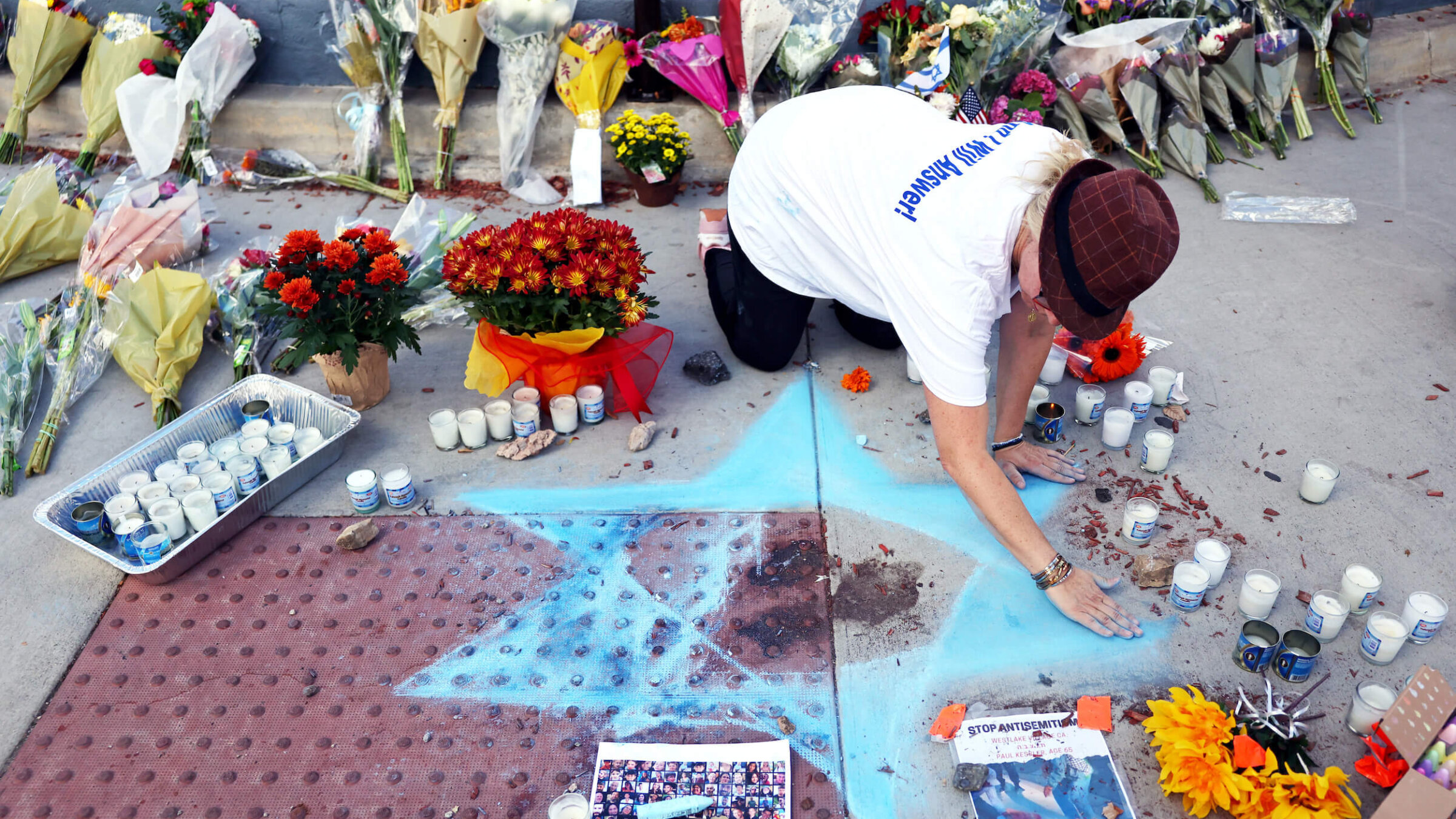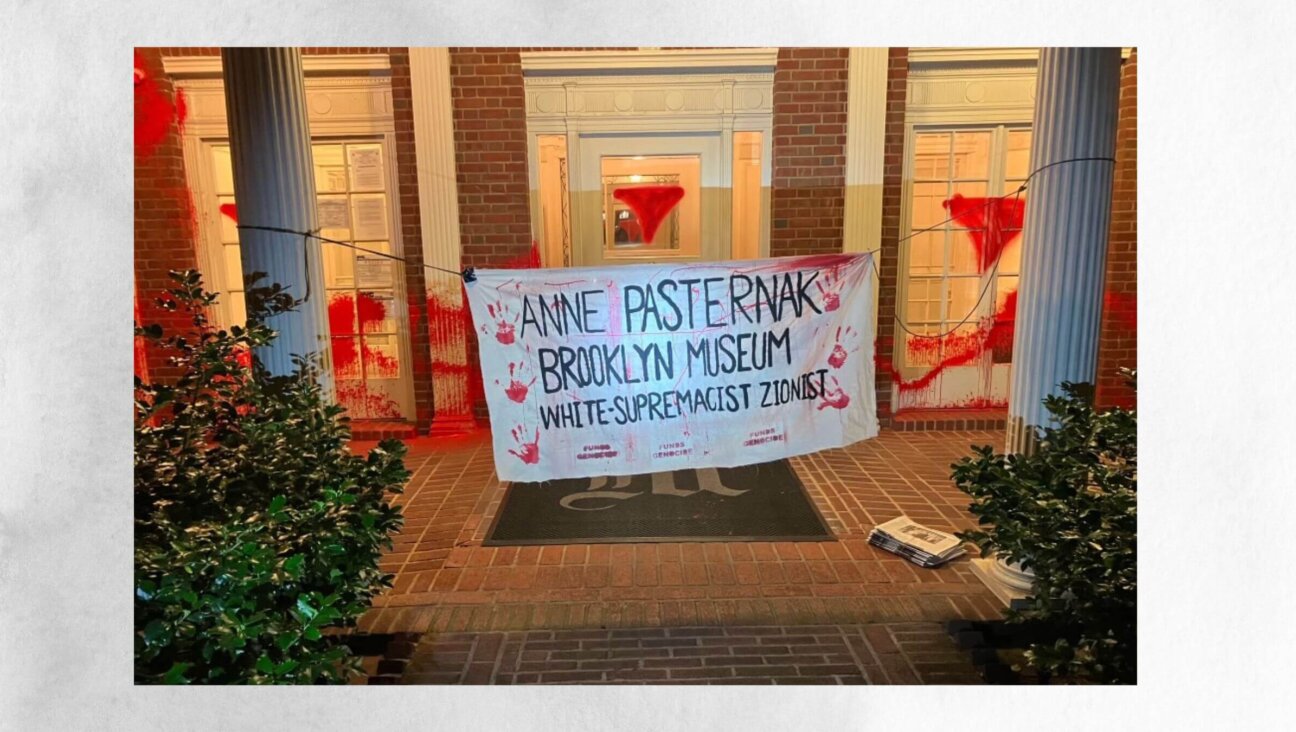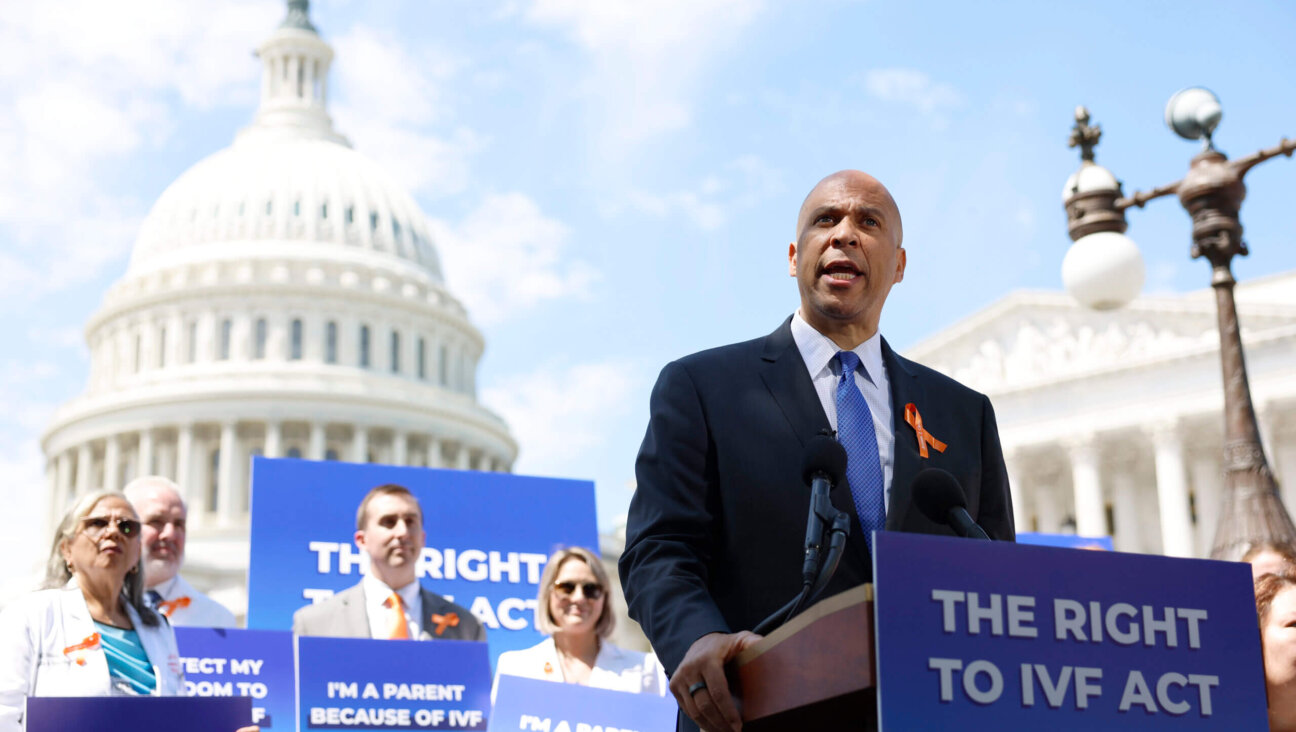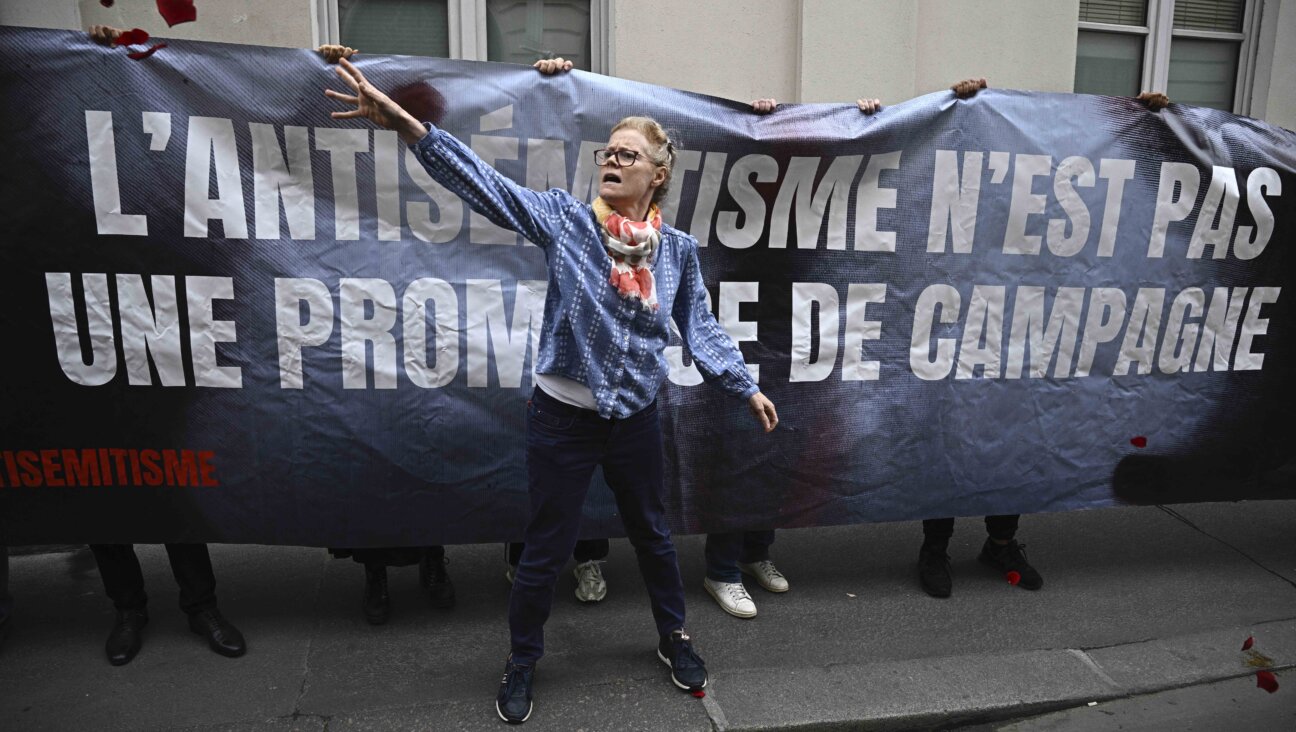A 69-year-old Jew died after a confrontation at a protest. His death offers important warnings
Paul Kessler stood up against pro-Palestinian protesters. It shouldn’t have ended tragically

Elena Colombo draws a Star of David at a makeshift memorial to 69-year-old Paul Kessler, who died following a Sunday altercation with a pro-Palestinian protestor in Thousand Oaks, California. Photo by Mario Tama/Getty Images
We still don’t know how exactly Paul Kessler died. All we know for sure is he didn’t have to.
At a Tuesday press conference about Kessler’s death following a Sunday confrontation with anti-Israel protesters in Thousand Oaks, Calif., the chief medical examiner of Ventura County said that Kessler’s cause of death had been determined to be a homicide. “The manner of death is a medical-legal determination,” he added. “Homicide does not indicate that a crime has been committed.”
Of course, there are Jewish groups who are already shouting, irresponsibly, on social media that this was an antisemitic murder, although the investigation is ongoing and no suspect has been arrested. (In fact, Ventura County Sheriff James Fryhoff told reporters, the suspect was one of the people who called 911 to get Kessler help.) And there are anti-Israel groups claiming Kessler, who was 69, started it.
The fact is that we simply don’t know enough yet to make any grand proclamations. What we do know is that Paul Kessler is dead, which is a tragedy.
Kessler set out on a beautiful L.A. morning to wave the Israeli flag, just as the man he faced off against in his final moments, a 50-year-old Arab American, woke up that morning compelled to defend Palestinians. That their confrontation ended in death should send us three giant, flashing warning messages.
The first message is: Be careful. The Jewish community in Los Angeles is understandably worried about antisemitic attacks in the wake of the war between Israel and Hamas. In February, long before the war began, a man was arrested for shooting two Jews walking out of synagogues in the Pico-Robertson neighborhood. He told police he was “targeting Jews.”
Two weeks ago, after the war began, a man broke into a Jewish family’s home in the San Fernando Valley and threatened to kill them. Police reports said the man screamed “Free Palestine!” as he was arrested.
America is not an antisemitic country — studies show Jews are consistently one of the most admired groups. But antisemitic acts have always spiked during flare-ups in Israel: A 2019 study by Ayal Feinberg, using FBI hate crime data from 2001 to 2014, found that antisemitic hate crime spiked 35% during periods of Israeli-Palestinian violence.
And during this unprecedented iteration of the conflict, they’ve quickly reached alarming peaks. “Homeland perpetrated violence can directly impact the security of diaspora communities,” Feinberg wrote.
This isn’t an excuse. Antisemites are responsible for antisemitism, not Israel. But it does help explain why, in a country where Jews have found historically unprecedented degrees of acceptance and safety, anti-Jewish violence breaks out.
The second message is: Don’t jump to conclusions. Yes, there have been horrible and shocking antisemitic attacks, in L.A. and around the world, especially at times of heightened tension in Israel. But the wisest thing to do, despite the emotional impetus to react quickly, is wait for the facts.
We saw the same script play out around a 2021 fight on La Cienega Blvd. in L.A., when pro-Israel and anti-Israel protesters clashed in front of a sushi restaurant. Many Jewish leaders immediately called the incident a pogrom, asserting that Arabs were out “hunting” Jews. Two years later, by the time the actual case against the attackers went through court, the slight penalties revealed a much more complicated story of mutual antagonism.
Kessler might very well have been the victim of a hate crime. But we just don’t know yet. Your X feed and Instagram story will certainly get more likes if you beat that drum. Your headline will get more clicks and your organizations may get more donations. But you will be doing the Jewish community of Los Angeles no favors by stoking unwarranted fear — especially when there is more than enough legitimate fear to go around.
The third message occurred to me as I watched a video recording of Kessler on the ground following the incident. The crowd of 75-100 protesters and counterprotesters is subdued, the shouting has stopped, and people are respectfully quiet as paramedics and police do their jobs.
And kneeling by Kessler’s side, with a look of grave concern on her face, is a woman in a headscarf with the words “Free Palestine” emblazoned on her shirt.
The image reminded me that America’s Jews and Muslims actually face similar threats and challenges as religious minorities. Just as antisemitic attacks have increased, so have Islamophobic incidents. According to FBI hate crime statistics, both are on the rise.
On Oct. 14, a man stabbed a six-year-old Palestinian boy to death in Chicago. On Nov. 3, according to a Saturday statement from the Santa Clara County Sheriff’s Office, a man aimed his SUV at a Muslim student at an anti-Israel protest at Stanford University and struck him before driving off, yelling profanities about “you and your people!”
American mosques are more likely to be attacked than any other houses of worship, followed by synagogues, according to a 2023 study by the A-Mark Foundation, which I run. Synagogues account for 3.2% of all congregations nationwide, but 22% of the attacks. Muslim congregations, which account for .6% of religious congregations nationwide, are the victims in 17% of attacks.
And while attacks against Christian houses of worship have a variety of motivations, the reasons people attack synagogues and mosques are overwhelmingly antisemitism and Islamophobia.
Sharing common threats should drive Muslim and Jewish communities closer together, if anything. But the suffering of our fellow Jews and Muslims thousands of miles away inflames our passions and sends us to the streets. When we find each other there, we can default to meeting as enemies.
The only wisdom I can offer comes from Abdulwahab Omira, the Syrian-born Stanford undergraduate who survived the hit-and-run attack.
“As I lay in my hospital bed, grappling with a reality I had never imagined, I reflect on the importance of spreading love, kindness, and compassion in a world that seems to be steadily succumbing to hatred and prejudice,” Omira said in a statement.
Those are wise words to take to heart even as, like Paul Kessler, we fearlessly stand up for our own.






















